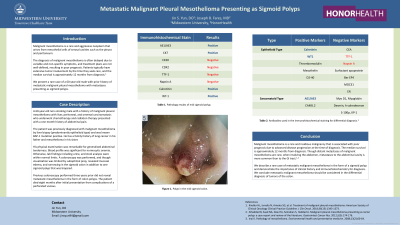Back


Poster Session B - Monday Morning
Category: Colon
B0114 - Metastatic Malignant Pleural Mesothelioma Presenting as Sigmoid Polyps
Monday, October 24, 2022
10:00 AM – 12:00 PM ET
Location: Crown Ballroom

Has Audio

Jin Yun, DO
Midwestern University
Presenting Author(s)
Jin Yun, DO1, Joseph Fares, MD2
1Midwestern University, Glendale, AZ; 2Midwestern Universisty, Phoenix, AZ
Introduction: Malignant mesothelioma is a rare and aggressive neoplasm that arises from mesothelial cells of serosal cavities such as the pleura and peritoneum. Diagnosis is often delayed due to variable and non-specific symptoms and treatment plans are not well-defined, resulting in poor prognosis. Patients typically have extensive tumor involvement by the time they seek care and median survival is approximately 12 months from diagnosis. We present a rare case of a 60-year-old male with metastatic mesothelioma presenting as sigmoid polyps.
Case Description/Methods: A 60-year-old non-smoking male with history of malignant pleural mesothelioma and associated liver and peritoneal carcinomatosis presented with one-month of abdominal pain. He was previously diagnosed with mesothelioma by liver biopsy and underwent chemotherapy and radiation. He has a family history of lung cancer in his father. Blood profile was significant for normocytic anemia; otherwise, findings including urine and stool analyses were within normal limits. Patient had generalized abdominal tenderness on exam.Colonoscopy revealed mucosal edema and narrowing in the sigmoid colon in addition to two sigmoid polyps that were biopsied. Pathology results showed the tissue to be positive for AE1/AE3, CK7, Calretinin, and WT-1; and negative for CK20, CDX2, TTF-1, and Napsin A, confirming metastatic mesothelioma. Colonoscopy performed three years prior was unremarkable. Patient died eight months after presentation from complications of perforated viscous.
Discussion: Malignant mesothelioma is a rare and insidious malignancy that is associated with poor prognosis due to advanced disease progression at the time of diagnosis. When involving the abdomen, metastases to abdominal cavity is more common than to the GI tract. We describe a rare case of metastatic mesothelioma presenting as sigmoid polyps and demonstrate the importance of clinical history and immunohistochemistry for diagnosis. We conclude that metastatic mesothelioma should be considered in the differential diagnosis of tumors of the colon.
Disclosures:
Jin Yun, DO1, Joseph Fares, MD2. B0114 - Metastatic Malignant Pleural Mesothelioma Presenting as Sigmoid Polyps, ACG 2022 Annual Scientific Meeting Abstracts. Charlotte, NC: American College of Gastroenterology.
1Midwestern University, Glendale, AZ; 2Midwestern Universisty, Phoenix, AZ
Introduction: Malignant mesothelioma is a rare and aggressive neoplasm that arises from mesothelial cells of serosal cavities such as the pleura and peritoneum. Diagnosis is often delayed due to variable and non-specific symptoms and treatment plans are not well-defined, resulting in poor prognosis. Patients typically have extensive tumor involvement by the time they seek care and median survival is approximately 12 months from diagnosis. We present a rare case of a 60-year-old male with metastatic mesothelioma presenting as sigmoid polyps.
Case Description/Methods: A 60-year-old non-smoking male with history of malignant pleural mesothelioma and associated liver and peritoneal carcinomatosis presented with one-month of abdominal pain. He was previously diagnosed with mesothelioma by liver biopsy and underwent chemotherapy and radiation. He has a family history of lung cancer in his father. Blood profile was significant for normocytic anemia; otherwise, findings including urine and stool analyses were within normal limits. Patient had generalized abdominal tenderness on exam.Colonoscopy revealed mucosal edema and narrowing in the sigmoid colon in addition to two sigmoid polyps that were biopsied. Pathology results showed the tissue to be positive for AE1/AE3, CK7, Calretinin, and WT-1; and negative for CK20, CDX2, TTF-1, and Napsin A, confirming metastatic mesothelioma. Colonoscopy performed three years prior was unremarkable. Patient died eight months after presentation from complications of perforated viscous.
Discussion: Malignant mesothelioma is a rare and insidious malignancy that is associated with poor prognosis due to advanced disease progression at the time of diagnosis. When involving the abdomen, metastases to abdominal cavity is more common than to the GI tract. We describe a rare case of metastatic mesothelioma presenting as sigmoid polyps and demonstrate the importance of clinical history and immunohistochemistry for diagnosis. We conclude that metastatic mesothelioma should be considered in the differential diagnosis of tumors of the colon.
Disclosures:
Jin Yun indicated no relevant financial relationships.
Joseph Fares indicated no relevant financial relationships.
Jin Yun, DO1, Joseph Fares, MD2. B0114 - Metastatic Malignant Pleural Mesothelioma Presenting as Sigmoid Polyps, ACG 2022 Annual Scientific Meeting Abstracts. Charlotte, NC: American College of Gastroenterology.
